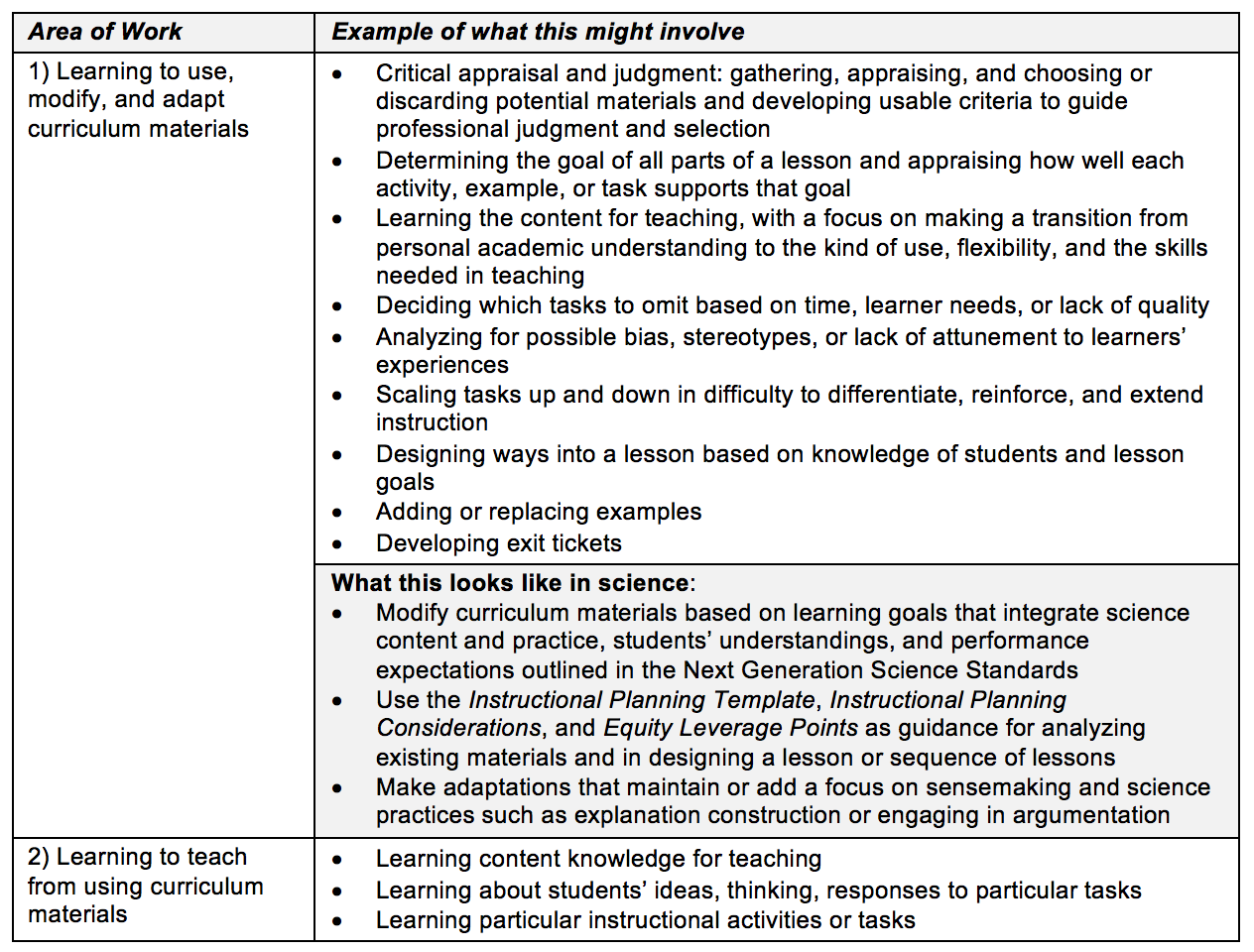What is choosing, analyzing, and modifying curriculum materials in science?
Here, we focus on choosing, adapting, and modifying curriculum materials—a subset of the larger high-leverage practice of Designing Single Lessons and Sequences of Lessons. There are three general approaches a teacher may take when modifying curriculum materials. These include implementing curriculum materials with high fidelity, designing curriculum materials from scratch, and thoughtful adaption drawing on created curriculum materials. We emphasize this final perspective, arguing for thoughtful and smart adaption of curriculum materials, without compromising the integrity of the science content.
Teachers are responsible for choosing, analyzing, and modifying curriculum materials so that their students can authentically engage in scientific practices around science ideas. The design and sequence of science lessons should help students work toward specific science learning goals. As a teacher modifies curriculum materials they should be considering students’ specific needs, assessing what questions and ideas that the materials will raise, and identifying where their students may be challenged.
Why work on choosing, analyzing, and modifying curriculum materials in science?
When novice teachers are supported in adapting curriculum materials, they are preparing their students to engage in many of the science practices. For example, they may take a lesson from their curriculum materials that focuses on terms and definitions and modify it is so that the students can plan and carry out an investigation in order to analyze and interpret data surrounding the terms being studied.
In addition, novice teachers can gain an improved understanding of science content as they study the layout of lessons in curriculum materials and make adjustments to align lessons with the Next Generation Science Standards and school and district requirements. By engaging with curriculum materials in this way, novice teachers may gain a deeper understanding of the science ideas and science practices and provide additional opportunities for students to learn about and engage with scientific phenomena in equitable and rigorous ways.
How do teachers choose, analyze, and modify curriculum materials?
Teachers analyze and modify materials differently, sometimes deciding to use parts of a text or activity and not others or combining material from more than one source. For example, in a lesson about the structure and function of plant stems, a teacher may notice the commercial curriculum materials adopted by a teacher’s district are not investigation-driven. Knowing that an investigation-based lesson would provide students additional opportunities for sensemaking, the teacher thoughtfully adapts the materials. Rather than following the curriculum materials with fidelity and conducting a demonstration showing that red water travels up a celery stem and explaining the science students are observing, the teacher chooses to modify the curriculum materials to include an investigation question and allows students to conduct the investigation on their own by engaging in scientific practices. To plan the investigation-based lesson, the teacher draws both the original curriculum materials and a lesson planning framework (e.g., Engage-Experience-Explain+Argue framework) to ensure students have opportunities to make sense of their experiences and construct scientific explanations about the function of a stem based on their observations.
What are the elements of the practice?
One important area of work for beginning teachers is to plan deliberately in ways that are responsive to students’ thinking, knowledge, and experience. This is difficult work, even for practicing teachers, and therefore learning to work with materials is a high-leverage skill for novice teachers. Teacher preparation programs can work with their novices on a small set of high-leverage sub-practices of working with curriculum materials that can enable these beginning teachers to plan using existing resources effectively in ways that are appropriate for their students.
A complementary area of work for beginning teachers is to learn from using curriculum materials. Curriculum materials often can contain useful content knowledge for teaching, insights about student thinking, and pedagogical approaches to specific ideas, including examples, models, sequences of development, connections, and tools or techniques for assessing students’ learning. Beginning teachers can be oriented to use curriculum materials in ways that enable to learn from them, not just use them for their immediate instruction. Teacher preparation programs can work with their novices on ways to be deliberate about learning from their engagement with curriculum materials that can enable these beginning teachers to carry forward usable knowledge and practice for subsequent teaching.

How do we support novice teachers to learn this practice?
In working on this practice in teacher education, we focus on helping novice teachers recognize the importance of implementing norms and routines for classroom discourse and work. Some novice teachers may not feel as comfortable with the science practices, and may have similar alternative explanations of how science is done as children do. Supporting novice teachers in anticipating these ideas and potential areas of struggle students may have when engaging in science practices is important. Doing so encourages a deeper understanding of the science practices they are asking students to engage in and can boost confidence in enactment by helping them to envision student successes and missed opportunities.
Novice teachers also typically have difficulty knowing how to identify, name, and provide students with authentic opportunities to engage in the science practices. We support them in this area by providing them with examples of how a teacher might identify and name the norms and routines for discourse and work in science. These activities provide concrete examples of how to implement norms and routines that can be adapted for different instructional purposes or simply used as is.
We also work with our novice teachers on designing tasks that give students authentic opportunities to share their ideas about the scientific practices and then have opportunities to repeatedly engage in the science practices through investigation-based lessons. We do this by supporting novice teachers to use the EEE+A framework to develop investigations that require students to engage with phenomena and come up with their own explanations based on the data they collect.